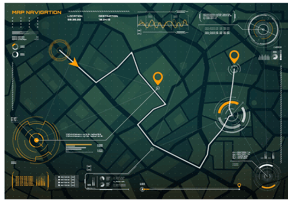In an increasingly data-driven world, the banking and finance sector is leveraging location...
Beyond Maps: Navigating the World of Geocoding for Enhanced Data Insights in Logistics Operations
In the fast-evolving world of logistics, where precision and efficiency are paramount, the integration of geocoding technology has become a game-changer.
 Geocoding, the process of converting addresses into geographic coordinates - latitude & longitude, is no longer merely about plotting points on a map—it's a strategic tool that logistics professionals leverage to optimize operations, enhance decision-making, and ultimately improve efficiencies in the entire supply chain. It has a direct impact on field operations and fleet productivity.
Geocoding, the process of converting addresses into geographic coordinates - latitude & longitude, is no longer merely about plotting points on a map—it's a strategic tool that logistics professionals leverage to optimize operations, enhance decision-making, and ultimately improve efficiencies in the entire supply chain. It has a direct impact on field operations and fleet productivity.
The Role of Geocoding in Logistics
Real-Time Location Tracking
Geocoding provides logistics operations with the ability to track the real-time location of shipments, vehicles, and assets. By converting addresses into precise coordinates, field operations/logistics/dispatch managers can monitor the movement of goods at every stage, ensuring transparency and visibility throughout the supply chain.
Route Optimization
A primary benefit of geocoding is its ability to impact route optimization. By accurately mapping delivery points, geocoding algorithms can calculate the most efficient routes for delivery vehicles. This not only minimizes travel time but also reduces fuel consumption, leading to significant cost savings and a smaller environmental footprint.
Dynamic Resource Allocation
Geocoding enables logistics professionals to dynamically allocate resources based on real-time data. For example, if there's a sudden surge in demand in a particular region, geocoding can help reroute vehicles and redistribute inventory to ensure timely deliveries.
Address Verification for Accuracy
Inaccurate addresses can lead to delivery delays and operational inefficiencies. Geocoding not only converts addresses into coordinates but also verifies the accuracy of the provided address. This ensures that logistics operations are based on reliable location data, reducing the risk of errors.
Enhanced Customer Experience
Geocoding plays a crucial role in enhancing the customer experience in logistics. With real-time tracking and accurate estimated time of arrivals (ETAs), customers receive timely updates on the status of their shipments. This transparency builds trust and satisfaction, contributing to a positive brand image.
Geocoding APIs: Powering Logistics Efficiency
The implementation of Geocoding APIs in logistics operations takes the benefits to a whole new level. These APIs offer seamless integration of geocoding capabilities into existing systems, providing logistics professionals with on-demand access to accurate and up-to-date location data.
Precision in Location Data
Geocoding APIs ensure high precision in converting addresses to geographic coordinates. This precision is crucial for logistics operations, where the accuracy of delivery locations can significantly impact the overall efficiency of the supply chain.
Real-Time Updates
In the dynamic landscape of logistics, real-time information is invaluable. Geocoding APIs provide logistics professionals with instant updates on changes in addresses, road networks, and delivery points, ensuring that the information used for decision-making is always current.
Scalability for Growing Operations
As logistics operations expand, so does the need for scalable solutions. Geocoding APIs are designed to handle varying levels of geocoding requests, making them suitable for both small-scale logistics providers and large enterprises with extensive supply chain networks.
Secure & Seamless Integrations with Existing Systems
Geocoding APIs seamlessly integrate with existing logistics management systems, eliminating the need for a complete overhaul of infrastructure. This integration ensures a smooth transition to a geocoding-enhanced logistics operation without disrupting ongoing processes.
Cost-Efficiency in Implementation
Implementing Geocoding APIs in logistics operations is a cost-effective solution. Instead of investing in the development and maintenance of an in-house geocoding system, logistics providers can leverage the capabilities of a reliable API, saving both time and resources.
Overcoming Challenges and Ensuring Success
While the benefits of geocoding in logistics are evident, addressing challenges is crucial for ensuring successful implementation.
Privacy and Compliance
With the collection of location data, privacy concerns come to the forefront. Logistics providers must navigate the regulatory landscape and ensure compliance with privacy laws to protect customer data.
Data Quality Assurance
The accuracy of geocoded data is paramount in logistics. Regular validation and verification processes must be in place to maintain data quality and reliability. This includes addressing changes in infrastructure, new developments, and alterations in delivery points.
Employee Training and Adoption
For a geocoding solution to be effective, employees must be trained on its usage and integration into daily operations. Ensuring that teams are comfortable with the technology fosters a smoother transition and maximizes the benefits.
Continuous Monitoring and Updates
The logistics landscape is ever-evolving, with changes in road networks, urban development, and customer preferences. Continuous monitoring and regular updates to geocoding systems are essential for adapting to these changes and maintaining operational efficiency.
Trends in Geocoding for Logistics
The future of geocoding in logistics holds exciting possibilities, driven by advancements in technology and evolving industry needs.
Integration with IoT Devices
The integration of geocoding with Internet of Things (IoT) devices is expected to rise. This includes real-time tracking through connected sensors on vehicles and assets, providing even more granular data for logistics optimization.
Machine Learning for Predictive Analytics
Machine learning algorithms will play a more significant role in predictive analytics for logistics. These algorithms can analyze vast amounts of historical geocoded data to predict future trends, optimize routes, and proactively address potential challenges.
Blockchain for Enhanced Security
Blockchain technology is likely to be integrated into geocoding systems to enhance security and transparency in logistics operations. This can provide an immutable record of location data, reducing the risk of tampering or fraud.
Conclusion
Geocoding has transcended its traditional role in mapping and navigation to become a cornerstone of enhanced data insights in logistics operations. The combination of precise location data, seamless integration through APIs, and the ability to overcome challenges positions geocoding as a key enabler of efficiency, transparency, and customer satisfaction in the logistics industry.
As logistics providers continue to embrace and adapt to the evolving landscape of geocoding technology, the future promises even greater advancements in optimizing the movement of goods across the globe. For more information, feel free to get in touch with our experts!



